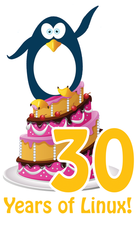This month we celebrate the steady and powerful Linux kernel
Kernel Talk

We celebrate 30 years of Linux with a special issue that takes you inside the kernel and shows you how to take your first steps with the kernel community.
Birthdays are always important, and birthdays that end in zero are especially significant. 30 years of Linux? Seriously? I guess we always knew that Linux was cool, but those of us who were around the water cooler in the early 90s when the first mentions of a new free operating system began to trickle out to Usenet groups never would have guessed that Linux would ever get as big as it is today, running on web servers and washing machines, desktops, cell phones, Mars rovers, and supercomputers around the world.
When we were considering a topic for the 30th birthday of Linux, it soon became clear that the only real way to celebrate was to write about Linux itself – not the agglomeration of software we know as a Linux distro, but the real Linux – the beating heart in the center of it all: the Linux kernel.
When it comes to birthdays, I should add: We ship this magazine all around the world, and it arrives on different shores on different dates over a range of almost two months. So I'm not sure when this issue will actually reach you, but the date we are commemorating is August 25, 1991, when a Finnish college student named Linus Torvalds left a message on the MINIX newsgroup announcing that he was working on a new operating system.
[...]
Buy this article as PDF
(incl. VAT)
Buy Linux Magazine
Subscribe to our Linux Newsletters
Find Linux and Open Source Jobs
Subscribe to our ADMIN Newsletters
Support Our Work
Linux Magazine content is made possible with support from readers like you. Please consider contributing when you’ve found an article to be beneficial.

News
-
New Linux Botnet Discovered
The SSHStalker botnet uses IRC C2 to control systems via legacy Linux kernel exploits.
-
The Next Linux Kernel Turns 7.0
Linus Torvalds has announced that after Linux kernel 6.19, we'll finally reach the 7.0 iteration stage.
-
Linux From Scratch Drops SysVinit Support
LFS will no longer support SysVinit.
-
LibreOffice 26.2 Now Available
With new features, improvements, and bug fixes, LibreOffice 26.2 delivers a modern, polished office suite without compromise.
-
Linux Kernel Project Releases Project Continuity Document
What happens to Linux when there's no Linus? It's a question many of us have asked over the years, and it seems it's also on the minds of the Linux kernel project.
-
Mecha Systems Introduces Linux Handheld
Mecha Systems has revealed its Mecha Comet, a new handheld computer powered by – you guessed it – Linux.
-
MX Linux 25.1 Features Dual Init System ISO
The latest release of MX Linux caters to lovers of two different init systems and even offers instructions on how to transition.
-
Photoshop on Linux?
A developer has patched Wine so that it'll run specific versions of Photoshop that depend on Adobe Creative Cloud.
-
Linux Mint 22.3 Now Available with New Tools
Linux Mint 22.3 has been released with a pair of new tools for system admins and some pretty cool new features.
-
New Linux Malware Targets Cloud-Based Linux Installations
VoidLink, a new Linux malware, should be of real concern because of its stealth and customization.
